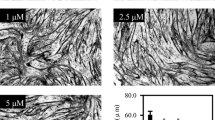Abstract
We have previously shown that heat shock protein 70 (HSP70) markedly inhibits H2O2-induced apoptosis in mouse C2C12 myogenic cells by reducing the release of Smac. However, the molecular mechanism by which HSP70 interferes with Smac release during oxidative stress-induced apoptosis is not understood. In the current study, we showed that HSP70 increased the stability of Bcl-2 during oxidative stress. An antisense phosphorothioate oligonucleotide against Bcl-2 caused selective inhibition of Bcl-2 protein expression induced by HSP70 and significantly attenuated HSP70-mediated cell protection against H2O2-induced release of Smac and apoptosis. Taken together, our results indicate that there are important relationships among HSP70, Bcl-2, release of Smac, and induction of apoptosis by oxidative stress.





Similar content being viewed by others
Abbreviations
- HSP70:
-
Heat shock protein 70
- H2O2 :
-
Hydrogen peroxide
- IAPs:
-
Inhibitors of apoptosis proteins
- Smac:
-
The second mitochondria-derived activator of caspases
- COX II:
-
Cytochrome oxidase subunit II
- DTT:
-
Dithiothreitol
- DMEM:
-
Dulbecco’s modified Eagle’s medium
- PBS:
-
Phospate-buffered saline
- Apaf-1:
-
Apoptotic protease activating factor-1
References
Arya R, Mallik M, Lakhotia SC (2007) Heat shock genes—integrating cell survival and death. J Biosci 32:595–610
Bivik C, Rosdahl I, Ollinger K (2007) Hsp70 protects against UVB induced apoptosis by preventing release of cathepsins and cytochrome c in human melanocytes. Carcinogenesis 28:537–544
Chao DT, Korsmeyer SJ (1998) BCL-2 family: regulators of cell death. Annu Rev Immunol 16:395–419
Danial NN, Korsmeyer SJ (2004) Cell death: critical control points. Cell 116:205–219
Didelot C, Schmitt E, Brunet M, Maingret L, Parcellier A, Garrido C (2006) Heat shock proteins: endogenous modulators of apoptotic cell death. Handb Exp Pharmacol 26:171–198
Du C, Fang M, Li Y, Li L, Wang X (2000) Smac, a mitochondrial protein that promotes cytochrome c-dependent caspase activation by eliminating IAP inhibition. Cell 102:33–42
Feng X, Bonni S, Riabowol K (2006) HSP70 induction by ING proteins sensitizes cells to tumor necrosis factor alpha receptor-mediated apoptosis. Mol Cell Biol 26:9244–9255
Gosslau A, Ruoff P, Mohsenzadeh S, Hobohm U, Rensing L (2001) Heat shock and oxidative stress-induced exposure of hydrophobic protein domains as common signal in the induction of hsp68.J Biol Chem 276:1814–1821
Jacobs AT, Marnett LJ (2007) Heat shock factor 1 attenuates 4-hydroxynonenal-mediated apoptosis: critical role for heat shock protein 70 induction and stabilization of Bcl-XL. J Biol Chem 282:33412–33420
Jacobson MD, Weil M, Raff MC (1997) Programmed cell death in animal development. Cell 88:347–354
Jiang B, Xiao W, Shi Y, Liu M, Xiao X (2005a) Heat shock pretreatment inhibited the release of Smac/DIABLO from mitochondria and apoptosis induced by hydrogen peroxide in cardiomyocytes and C2C12 myogenic cells. Cell Stress Chaperones 10:252–262
Jiang B, Xiao W, Shi Y, Liu M, Xiao X (2005b) Role of Smac/DIABLO in hydrogen peroxide-induced apoptosis in C2C12 myogenic cells. Free Radic Biol Med 39:658–667
Jiang B, Wang K, Jiang B, Liu M, Xiao X (2009) ATP-binding domain of heat shock protein 70 is essential for its effects on the inhibition of the release of the second mitochondria-derived activator of caspase and apoptosis in C2C12 cells. FEBS J 276(9):2615–2624
Kelly S, Zhang ZJ, Zhao H, Xu L, Giffard RG, Sapolsky RM, Yenari MA, Steinberg GK (2002) Gene transfer of HSP72 protects cornu ammonis 1 region of the hippocampus neurons from global ischemia: influence of Bcl-2. Ann Neurol 52(2):160–167
Kim R (2005) Recent advances in understanding the cell death pathways activated by anticancer therapy. Cancer 103:1551–1560
Kroemer G, Reed JC (2000) Mitochondrial control of cell death. Nat Med 6:513–519
Lui JC, Kong SK (2007) Heat shock protein 70 inhibits the nuclear import of apoptosis-inducing factor to avoid DNA fragmentation in TF-1 cells during erythropoiesis. FEBS Lett 581:109–117
Matsumori Y, Hong SM, Aoyama K, Fan Y, Kayama T, Sheldon RA, Vexler ZS, Ferriero DM, Weinstein PR, Liu J (2005) Hsp70 overexpression sequesters AIF and reduces neonatal hypoxic/ischemic brain injury. J Cereb Blood Flow Metab 25:899–910
Nylandsted J, Gyrd-Hansen M, Danielewicz A, Fehrenbacher N, Lademann U, Høyer-Hansen M, Weber E, Multhoff G, Rohde M, Jäättelä M (2004) Heat shock protein 70 promotes cell survival by inhibiting lysosomal membrane permeabilization. J Exp Med 200:425–435
Packham G, Stevenson FK (2005) Bodyguards and assassins: Bcl-2 family proteins and apoptosis control in chronic lymphocytic leukaemia. Immunology 114:441–449
Price DL, Sisodia SS, Borchelt DR (1998) Genetic neurodegenerative diseases: the human illness and transgenic models. Science 282:1079–1083
Ravagnan L, Gurbuxani S, Susin SA, Maisse C, Daugas E, Zamzami N, Mak T, Jäättelä M, Penninger JM, Garrido C, Kroemer G (2001) Heat-shock protein 70 antagonizes apoptosis-inducing factor. Nat Cell Biol 3:839–843
Schendel SL, Xie Z, Montal MO, Matsuyama S, Montal M, Reed JC (1997) Channel formation by anti-apoptotic protein Bcl-2. Proc Natl Acad Sci USA 94:5113–5118
Scorrano L, Korsmeyer SJ (2003) Mechanisms of cytochrome c release by proapoptotic BCL-2 family members. Biochem Biophys Res Commun 304:437–444
Stankiewicz AR, Lachapelle G, Foo CP, Radicioni SM, Mosser DD (2005) Hsp70 inhibits heat-induced apoptosis upstream of mitochondria by preventing Bax translocation. J Biol Chem 280:38729–38739
Strasser A (2005) The role of BH3-only proteins in the immune system. Nat Rev Immunol 5:189–200
Verhagen AM, Ekert PG, Pakusch M, Silke J, Connolly LM, Reid GE, Moritz RL, Simpson RJ, Vaux DL (2000) Identification of DIABLO, a mammalian protein that promotes apoptosis by binding to and antagonizing IAP proteins. Cell 102:43–53
Zhao Y, Wang W, Qian L (2007) Hsp70 may protect cardiomyocytes from stress-induced injury by inhibiting Fas-mediated apoptosis. Cell Stress Chaperones 12:83–95
Acknowledgments
This study was supported by the grants from National Basic Research Program of China (2007CB512007) and The National Natural Science Foundation of China (30700290).
Author information
Authors and Affiliations
Corresponding author
Additional information
Bimei Jiang and Pengfei Liang made equal contributions to the study.
Rights and permissions
About this article
Cite this article
Jiang, B., Liang, P., Deng, G. et al. Increased stability of Bcl-2 in HSP70-mediated protection against apoptosis induced by oxidative stress. Cell Stress and Chaperones 16, 143–152 (2011). https://doi.org/10.1007/s12192-010-0226-6
Received:
Revised:
Accepted:
Published:
Issue Date:
DOI: https://doi.org/10.1007/s12192-010-0226-6




